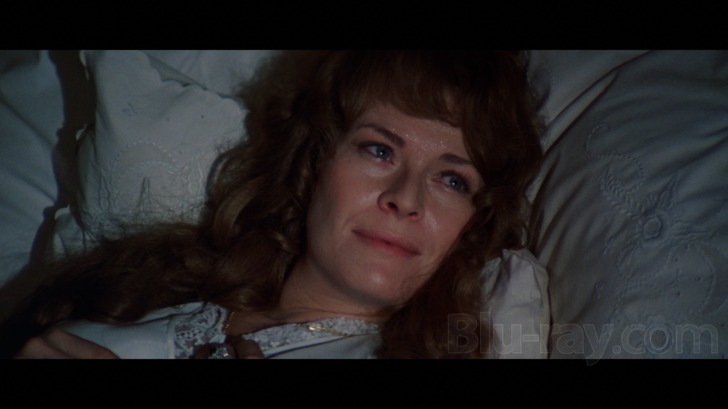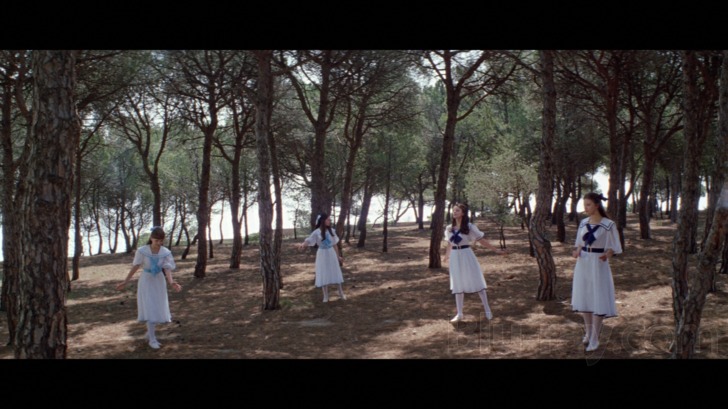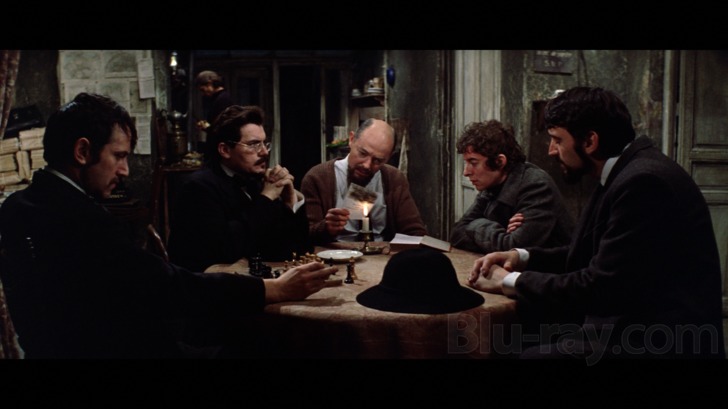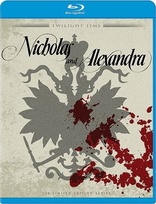Nicholas and Alexandra Blu-ray Movie
HomeNicholas and Alexandra Blu-ray Movie 
Limited Edition to 3000 - SOLD OUTTwilight Time | 1971 | 188 min | Not rated | Feb 12, 2013
Movie rating
7.1 | / 10 |
Blu-ray rating
| Users | 4.2 | |
| Reviewer | 4.0 | |
| Overall | 4.0 |
Overview
Nicholas and Alexandra (1971)
The real-life story of Czar Nicholas II, the last Russian monarch, his wife Alexandra and their daughters. The imperial family is overthrown and exiled to Siberia with a painful secret that binds them all to the mystical monk Rasputin.
Starring: Michael Jayston, Janet Suzman, Lynne Frederick, Fiona Fullerton, Harry AndrewsDirector: Franklin J. Schaffner
| Drama | Uncertain |
| History | Uncertain |
| Biography | Uncertain |
Specifications
Video
Video codec: MPEG-4 AVC
Video resolution: 1080p
Aspect ratio: 2.35:1
Original aspect ratio: 2.35:1
Audio
English: DTS-HD Master Audio Mono (48kHz, 24-bit)
Music: DTS-HD Master Audio 2.0
Subtitles
English SDH
Discs
50GB Blu-ray Disc
Single disc (1 BD)
Playback
Region free
Review
Rating summary
| Movie | 4.0 | |
| Video | 4.5 | |
| Audio | 4.0 | |
| Extras | 2.5 | |
| Overall | 4.0 |
Nicholas and Alexandra Blu-ray Movie Review
Bleeding to death from a self inflicted wound.
Reviewed by Jeffrey Kauffman February 16, 2013It’s always interesting to see what a director chooses as his follow up to an immense success, for in the wild and wooly world of filmmaking, there’s probably no better time to actively chart one’s course the way one really wants to than directly after a critical and box office success. Franklin J. Schaffner had had a rather august career already in television (winning an Emmy for the original version of Twelve Angry Men), before moving to film and directing such well regarded outings as Gore Vidal’s The Best Man and the seriously underappreciated The War Lord. Schaffner started to hit the big time in 1968 with the immense success of Planet of the Apes, but it was 1970’s Patton that really put Schaffner atop the A- list, with one of those “A”’s being an Academy Award for Best Director. Schaffner had already demonstrated his range with his relatively few but rather wide ranging film oeuvre, but his next outing seemed to be his attempt for a David Lean like majesty of blending an intimate personal story with epochal historical events. Now it should be stated up front that evidently producer Sam Spiegel reached out to Schaffner after Spiegel's first choice(s) for director didn't pan out, as there was a lot of money (and prestige) on the line, but it was still up to Schaffner to accept the offer, which he did. Robert K. Massie’s international bestseller Nicholas and Alexandra had done a remarkable job of personalizing the last Tsar and Tsarina of Russia, putting their personal trials (and peccadilloes) in the context of a simmering societal upheaval, all wrapped around the devastating genetic anomaly of hemophilia. Schaffner chose to bring this epic story to life in a sumptuously huge production which received quite a bit of critical acclaim and six Academy Award nominations (including Best Picture), but which never really caught fire at the box office. Perhaps audiences in the early seventies simply weren’t that interested in revisiting a time that seemed too opulent by half and characters that had little relevance to their own lives. Subsequent years brought a somewhat new (or at least revived) interest in the subject when longtime Anastasia claimant Anna Anderson was proven to be a fake after a DNA test, and then when the opening of long repressed Soviet files finally allowed the remains of the royal family to be found (Massie wrote a fascinating followup called The Romanovs: The Final Chapter after the files were released, which I highly recommend), and so the time may in fact be riper than ever for a new audience to explore a sad, deeply flawed and yet somehow noble family whose personal problems and bad decisions wreaked havoc on world history for decades after their own grisly demise.

One of the oddest things about Nicholas and Alexandra's Tsarist Russia, at least in the formulation of Massie and screenwriter James Goldman, is that while the Romanov family’s stupidity in any number of situations is inarguable, they still seem to be at least putatively the “good guys”, perhaps due to their ignominious end. Rabble rousers like Lenin and Trotsky, who would perhaps be more likely to be thought of as the heroes of the working class (if we were to ignore all of the horrors done in their names after the fact), come off as petulant brats, well meaning perhaps, but brats nonetheless. It’s a rather odd dichotomy, and one which also may have doomed the film in its theatrical exhibition—after all, we Americans are not used to rooting for royalty and booing the “common man”. But there's a rather odd dialectic at work in this film that may remind some viewers (as odd as this may sound) of the phenomenally successful series Downton Abbey: in both cases, there are main characters who find the world around them changing too quickly for them to adjust easily, but in both cases, the audience actually feels sympathy, not revulsion, for these characters.
Part of what makes the essential tragedy at the core of Nicholas and Alexandra so believable (despite the film's rather glossy trappings) is the simple fact that it all stems from a parent’s desperate attempts to manage the precarious health of a child. While Nicholas (Michael Jayston) might be faulted for all sorts of strategic errors, including a seeming willful blind eye to what current day politicos call the “optics” of any given situation, it was actually Alexandra’s (Janet Suzman) decision to “hire” the quasi-shaman Rasputin (Tom Baker) to “treat” the hemophiliac child Alexei which the film posits as the overall worst decision that either of the royals made. There’s therefore a bizarre triangle of sorts at the center of Nicholas and Alexandra. If it’s not exactly romantic, there are hints of a sort of illicit attraction between Rasputin and Alexandra, if for no other reason than that the Tsarina is absolutely convinced Rasputin is the only hope for her wounded son to survive and ultimately inherit the throne.
Much as with Massie’s source novel, James Goldman’s screenplay does an artful job of contrasting the rising political power of the Bolsheviks with the increasingly fragile situation with the Romanovs, both personally and professionally (so to speak). The film is nonetheless kind of overly episodic, lurching from the continuing health issues of Tsarevich Alexei (Roderic Noble) to the kind of internecine conflicts within Tsar Nicholas’ court as a series of ill conceived battles, both within and without Russia, begin to fray at the royal tapestry.
Perhaps due to budget constraints, the two leads in Nicholas and Alexandra were relative unknowns (at least to American audiences) , with most of the better known names (Sir Laurence Olivier, Sir Michael Redgrave, Jack Hawkins) filling out the huge supporting cast. The film is often impossibly beautiful, with Oscar winning sets and costumes and lush cinematography by Freddie Young, who of course lensed (and won Oscars for) three of David Lean’s biggest “intimate” epics, Lawrence of Arabia, Doctor Zhivago and Ryan’s Daughter (when are we going to see this underappreciated film on Blu-ray?). Schaffner stages several huge set pieces with a fair degree of élan (though one at times wishes for a more Eisensteinian approach to what is kind of haphazard editing).
Goldman’s screenplay is perhaps too stuffed with minutiae to ever become totally visceral. One of the things that made his Lion in Winter so palpably exciting was how intimately the audience became involved in the family dynamics of the characters, irrespective of the actual history being depicted. The opposite tack seems to take up a bit too much of Nicholas and Alexandra, with an overemphasis on historical facts and figures (some of which are not actually portrayed accurately) which tends to suck some of the life out of the intense personal drama.
The film is graced with some exceptionally fine performances. Suzman (Oscar nominated) really wrings a lot out of Alexandra’s torment, and Jayston does a fine job showing Nicholas’ rather peculiar combination of nobility and stupidity. The supporting cast is full of fantastic turns. Tom Baker really should have gotten an Oscar nod for his riveting Rasputin, and Olivier chews the scenery quite convincingly as Count Witte, one of “Nicky”’s confidantes and one who does not suffer his foibles calmly. The inexorably tragic trajectory of the story may leave some wondering what exactly Schaffner and Goldman are trying to say, but there’s a certain fastidious glamour to this film that, like the very era it recreates, hearkens back to a time of bygone glories, the likes of which will probably never be seen again.
Nicholas and Alexandra Blu-ray Movie, Video Quality 

Nicholas and Alexandra is presented on Blu-ray courtesy of Twilight Time with an AVC encoded 1080p transfer in 2.35:1. Twilight Time has found a really excellent partner in Sony-Columbia for this side of their licensing deal, with one remarkable looking high definition master after another having been offered to the distributor for release. Nicholas and Alexandra follows in this largely infallible tradition with a stellar looking high definition presentation that only has the tiniest of niggling issues to detract from what is certainly one of the most gorgeous, naturally filmic looking presentations that Twilight Time has released. Freddie Young's sumptuous cinematography pops magnificently throughout this presentation, and the colors are incredibly robust and well saturated (just take a look at screenshot 19 and marvel at the reds and blues). Fine detail is commendable in the film's many close-ups. Some wide shots do suffer from just a tad of softness, but the only real problem of any magnitude (and it's quite minor, frankly) is some crush in the darkest scenes, especially when Rasputin, who is always clad completely in black is in them. He tends to look like a disembodied head a time or two, but that perhaps only adds to the spookiness of the character. Otherwise, this is one fantastic looking Blu-ray that should easily please even the most picky videophile.
Nicholas and Alexandra Blu-ray Movie, Audio Quality 

It's perhaps a little disappointing that Sony-Columbia didn't repurpose Nicholas and Alexandra's original mono mix for what could have been a really exciting surround mix, but the lossless DTS-HD Master Audio Mono offering here ably supports both dialogue and Richard Rodney Bennett's rousing score, even if some of the "busier" sequences tend to sound a bit crowded. Fidelity is excellent with good reproduction through all frequency ranges. Dynamic range is quite wide, with the DTS-HD Master Audio rendering easily handling both the hushed dialogue sequences as well as the noisier action segments.
Nicholas and Alexandra Blu-ray Movie, Special Features and Extras 

- Isolated Score is presented via a lossless DTS-HD Master Audio 2.0 track. Richard Rodney Bennett (who passed away on Christmas Eve 2012) received an Oscar nomination for his stirring score for Nicholas and Alexandra. Eagle eyed viewers who like to peruse the tinier credits may notice the additional music was written by Christopher Gunning. That name may not ring any immediate bells, but he was responsible for the instantly recognizable theme music to the long running David Suchet Poirot series.
- Original Theatrical Trailer (1080p; 4:25)
- Changing Faces (1080p; 6:31) is one of three vintage featurettes included on this Blu-ray. This one details the rather amazing makeup that transformed the actors into their historical counterparts.
- Royal Daughters (1080p; 8:03) is narrated by Lynne Frederick and takes a look at the four young actresses (including Fiona Fullerton, who would go on to play Alice in the John Barry musicalization of Alice in Wonderland) playing the young Tsarinas.
- The Royal Touch (1080p; 6:04) focuses on the Oscar winning costumes.
Nicholas and Alexandra Blu-ray Movie, Overall Score and Recommendation 

Nicholas and Alexandra is an impeccably handsome film, but there's no denying it suffers from a certain emotional distance, something that tends to afflict many such "intimate" epics that focus on famous historical figures. Schaffner directs with calm assurance, and both the cast and crew offer incredibly well wrought contributions. The film is certainly one of the most gorgeous of its era from a purely production design perspective, but it's also graced with some unusually excellent performances. You may not really care about any of the characters here, either the royals or the burgeoning underclass epitomized by Lenin, Trotsky and the rest of the Bolsheviks, but Nicholas and Alexandra is still a largely captivating film. This Blu-ray looks stupendous and sounds fine. Highly recommended.
Similar titles
Similar titles you might also like

The Queen
2006

J. Edgar
2011

Jackie
2016

The King's Speech
2010

Alexander the Great
1956

Becket
1964

Frost/Nixon
2008

First Man 4K
2018

The Lion in Winter
Special Edition
1968

The Last Emperor 4K
Theatrical (4K/BD) and Television (BD) Versions
1987

The Last King of Scotland
2006

Winnie Mandela
2011

The Iron Lady
2011

Cesar Chavez
2014

Dallas Buyers Club
2013

John Adams
2008

Darkest Hour 4K
2017

Kundun
1997

The Lady
2011

Gandhi 4K
1982
